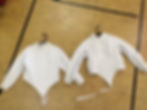Fencing Newbie: How do I put all this practice gear on? And what’s it all called again?
- Kate
- Oct 14, 2014
- 2 min read
Updated: Jul 20, 2020
One of the great things about our sport is that we get to hit each other with sabres. In order to keep us safe, we need to put quite a few layers of practice gear on. It’s not easy to remember the names of all the pieces, much less how to “get dressed”. Here’s a post to help you visually review what you’ve learned in your class + I’ve also included a video of how to put it all on.

This first piece of gear is called the plastron, or under-arm protector. It goes on over the shoulder of the dominant arm, with straps going around the torso to keep it in place. This should be the first item you put on.

The next piece of gear is required for every female fencer, no matter their age. Male fencers can wear them if they wish. Chest protectors come in two kinds: “flat” and “with bumps”. They go by all kinds of nicknames, including Xena bras; some fencers even decorate them 🙂 The reason I recommend putting them on top of the plastron is that they trap sweat and heat if worn on top of your t-shirt.

Next comes the jacket. They also come in two kinds: front-zip and back-zip. The “pointy” part of the jacket always goes in the front; you can see that the zipper on the jacket on the right is on the front when the “pointy” part is on top. This makes it a “front-zip”. The zipper on the jacket on the left is hidden; we know this is a “back-zip” jacket. When you buy your own gear, make sure you get a front-zip so you don’t need help getting in and out of it at practice and at tournaments.

You wear your glove on the outside of the sleeve on your fencing arm. The top glove is for a right-handed fencer; the bottom is made for a lefty. Use the velcro to open it up and then tuck your sleeve inside it. This will keep a sabre blade from accidentally slipping up your sleeve and causing you harm. You do not wear a glove on your non-fencing hand. In fact, that hand will be the only exposed skin you have while fencing.

To protect your head, you wear a mask. The black and white mask on the right is a practice mask. Epeeists also wear these for competition. Sabre masks must be covered in metal fabric since the head is target area. The back of a mask is open to make it easy to take on and off; this is not a safety issue since fencers do not turn their back on their opponent while fencing.

An optional addition to your practice gear is fencing shoes. A lot of beginners choose to wear gym shoes; this will be alright for a while but you will have better footwork (and fewer ankle/foot injuries) with a pair of fencing shoes. They are flat on the bottom and have reinforced parts on the sides that help you align your feet properly when you lunge. You can also purchase inserts to help with arch support since fencing shoes don’t really support your feet like tennis shoes do.
Here’s a link to a video on my YouTube page to help you remember how to put everything on:








